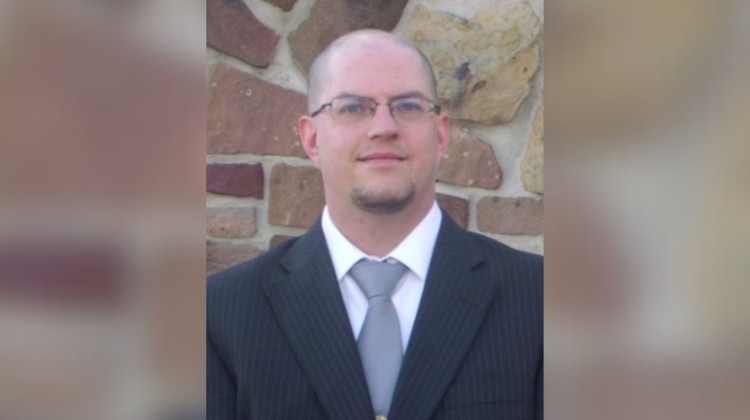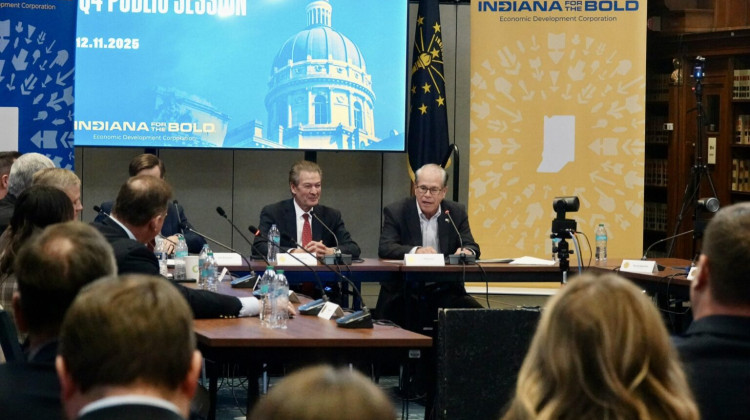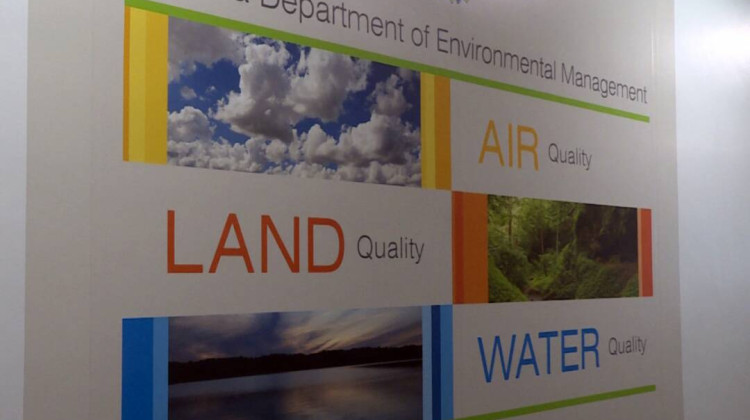
Derrick Holder is an organ transplant medical transporter. This is his first time running for office. Reporter Zak Cassel sat down with Holder to discuss why he's running for the seat.
Courtesy of Derrick Holder's campaign websiteWFYI is speaking with U.S. House of Representatives candidates running for election in Central Indiana.
Derrick Holder is the Democrat running for election in Indiana’s 4th Congressional District, which represents a large western area of the state including Martinsville, Crawfordsville and Lafayette. He faces Republican incumbent Jim Baird and Libertarian Ashley Groff.
Holder is an organ transplant medical transporter. This is his first time running for office.
WFYI's Zak Cassel sat down with Holder to discuss why he's running for the seat.
This transcript has been lightly edited for clarity and style. WFYI fact checks all candidate interviews and provides editor’s notes in the audio and digital publications.
Zak Cassel: I want to start out with a broad question. Our country is facing multiple crises in politics, the economy, social issues such as abortion, and more. If you’re elected to represent Indiana’s Fourth Congressional district, what will your top legislative priorities be?
Derrick Holder: The top ones would be — I mean, how our economy’s going right now is actually, it’s going great right now, it’s just purely corporate greed that’s having the issue. So, legislatively, you can’t really do much about corporate greed.
Abortion, we have to make sure that bodily autonomy is between a person and their doctor, and we cannot legislate what’s going on between them. It’s a person’s choice. Even though we may not agree with it, who are we to tell someone else how to live their lives?
Cassel: What are your policy proposals for these priorities?
Holder: [pauses] I believe that… when it comes to bodily autonomy, we have to make it where — reinvoke Roe v. Wade to make it completely legal for abortions within reason. And the old way, second trimester, is — I mean, it did well since the 70's. And it’s… it's just crazy now how we’re starting to go backwards in politics rather than forward, and we need to come together on that.
Cassel: How about for the economy and inflation?
Holder: Inflation’s actually been coming down, and it’s been coming down in record numbers.* So, when we talk about “economy,” it’s — we have to start thinking like an economist would. And I know our knee-jerk reaction is to blame the politicians, but we have to start looking at the record-breaking profits of corporations.
*Editor's note: For context, according to the Bureau of Labor Statistics, the Consumer Price Index has decreased from a high of 9.1 percent for all items in August 2022 to 2.5 percent in August 2024. You can read more about inflation here, where NPR reports, “It doesn’t mean that prices are falling, which is deflation. And as noted, that is not usually a good thing for the economy.”
Cassel: Now I want to get more specific. Your Congressional district is pretty rural. Your Republican opponent, incumbent Rep. Jim Baird, sits on the House Agriculture Committee. The so-called farm bill is a major piece of legislation, but Democrats and Republicans have strongly disagreed on the bill’s renewal. The farm bill includes financial assistance to farmers and funding for the food stamp program. It also includes funding for research. But the Republican-backed proposal makes significant cuts to SNAP, the food stamp program, by some estimates $30 billion. It also removes climate-forward requirements farmers must meet to access certain financial assistance. These proposals are opposed by Democrats who have put forward a competing bill in the Senate. If elected, what agriculture policy priorities would you pursue and how would you work to overcome partisan gridlock to pass legislation?
Holder: I believe that… SNAP is there to help families that are in need, for that moment. And, we can actually help our farmers out with the SNAP program. That way, during farmers markets, when they bring their crops to the farmer’s market, enable the SNAP program people, that are needing financial assistance through SNAP, to be able to get a certain percentage more at farmers markets, because it’s fresh fruit and produce, thus pitting the nutritional part of SNAP. And it will help the local farmers, the small farmers, out with that.
And I totally believe that we have to have both big agribusiness and local, small family farmers combined together, because the big agrifarmer goes more national and international, and the local is more of the farm-to-table.
Cassel: Would you consider cuts to SNAP and removing climate requirements to access financial assistance in order to pass legislation that would help farmers?
Holder: No. We — I mean, the people who need SNAP, need SNAP. The — once again, it goes to corporate greed on not paying employees a living wage, and the government’s having to make that up.
Cassel: Purdue University puts out an annual report on climate impacts in Indiana and indicates that some of the greatest risks in the state will come from hotter temperatures, increased rain, and flooding. Nationally, the past 10 consecutive years have been the hottest on record since 1850. Heat waves have resulted in deaths across the country. How would your overall policies address the impacts of climate change?
Holder: We need to increase research on green energy, and try to get away from fossil fuels. I know we can’t just go cold turkey on ‘em. We need to have more wind turbines out there, but on brownfield area where crops are not growing. Same thing with solar panels — in brownfields. That way it’s not disturbing what land is used for crops. So, we just have to do green energy smartly.
Cassel: I want to shift gears here. Immigration is once again front and center this election. The Republican party’s 2024 platform proposes the largest deportation in the country’s history, and strengthening ICE and border protections, among other things. The Democratic Party’s 2024 platform proposes policies that increase opportunities for “legal, permanent immigration.” What are your immigration policies?
Holder: First of all, we need to secure all of our borders. It’s not just the Southern border, but Northern and our coastlines. Most illegal immigrants actually come from Asia.* But, I am totally for legal immigration, because that’s what our nation is built on. We’re all immigrants to this nation, unless you are of a native nation. But, we need to make it where it’s a little bit easier to get the citizenship, or get onto the road of citizenship.
*Editor's note: Pew Research estimated based on US Census data that unauthorized immigrants coming from Latin America made up 71.6 percent in 2022, while Asia only made up 15.5 percent of all unauthorized immigrants.
Cassel: In the agriculture industry, there are an estimated 2.9 million farmworkers in the U.S., according to the National Center for Farmworker Health. About 78 percent [Cassel misspoke here and the number is 70] are foreign-born. These farmworkers are a vital part of the country’s agricultural production. The Center said they are also among “the most socially and economically disadvantaged people in the U.S.” How will your immigration policies impact farmworkers in the 4th Congressional District?
Holder: It will give them that path to citizenship that they desperately want. Everyone that I’ve talked to, especially in Clinton and Carroll counties, which have large Hispanic populations in it, they just want the ability to become legal citizens to the U.S.*
Not with the green cards or not with the work visas, but they want to become citizens, and the delay that it takes for them to get the citizenship and actively participate in our government, is sorely lacking.
*Editor's note: The Hispanic population in 2020 made up 4.1 percent of Carroll County, according to the U.S. Census Bureau. And it made up 18.5 percent of Clinton county, which is the county with the third highest percentage of Hispanic population in Indiana.
Cassel: During the 2020 election's certification process, your opponent Rep. Jim Baird voted against certifying vote counts from both Pennsylvania and Arizona and lent his name to lawsuits challenging the results of the election. Perhaps the most prominent way critics now frame these challenges, and Former President Trump's rhetoric around that election's results, is that it's a threat to democracy. What do you make of those criticisms?
Holder: [pauses] It is the first time in our nation’s history that we’ve had this issue, and… I am not the type of person to be divisive. I believe that, as a nation, we are better than this. We need to come together as a nation again, and… issues like the 2020 election have just driven a wedge in the most extreme portions of society — which I believe most of us are in the middle and just want to work together with each other.
Cassel: There are Republicans openly preparing to challenge the results in November. Democrats are committing resources to brace for these legal challenges. Some see these pre-emptive challenges as a bad-faith campaign strategy. What kinds of preparations do you think are needed heading into this election?
Holder: I believe our elections work great… we just have to make sure that we watch the polls, as always, and have… intelligent poll workers, ones that actually know how the machines work, how the rules are supposed to be, rather than just throwing anyone into those positions.
Cassel: The Fourth Congressional district is predominantly rural. It’s also pretty conservative: A Democrat hasn’t won an election for this district since Jill Long in 1992. And your opponent, Rep. Baird, is an incumbent who has won three elections so far. If you win this election, how would you represent voters in the district as a Democrat?
Holder: See, I’m asked that quite a bit, and I am yes, running as a Democrat, but I’m not just gonna represent Democrats. I am running to represent Democrats, Republicans, independents, Libertarians — everybody in the Fourth District. We all care about our district, and I am going to be fully open to all my constituents. Phone lines will always be open, email inbox will always be open, for any comments or concerns about any bills that are trying to be passed. That way, I can speak in the voice of the district.
Cassel: Can you tell us who you're backing for Indiana Governor and U.S. President in the upcoming election?
Holder: I am backing Dr. Jennifer McCormick for governor. And for president, as of right now, it’s Vice President Harris, but we have to wait until the Democratic National Convention officially announces her as the presidential candidate.*
Cassel: Thanks for being with us, Derrick.
Holder: Thank you for having me.
*Editor's note: At the time of this interview the Democratic National Convention had not taken place. We followed up with Holder afterwards and he confirmed his support for Harris.
 DONATE
DONATE






 Support WFYI. We can't do it without you.
Support WFYI. We can't do it without you.